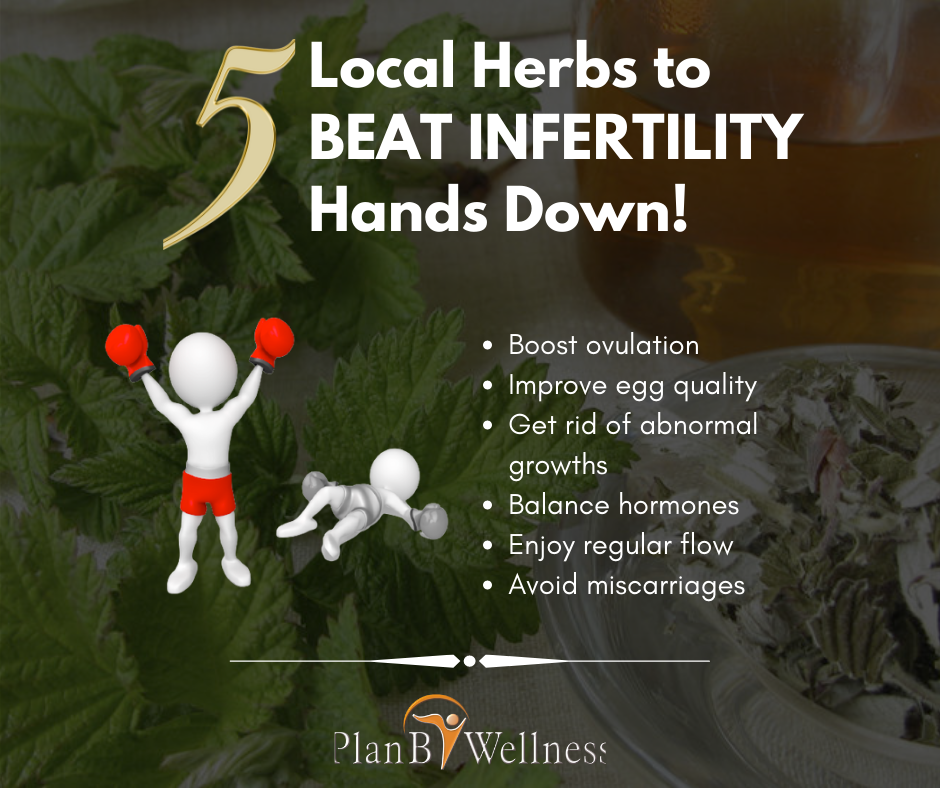Explained in this write up are 5 local herbs you can use to overcome infertility easily and with no adverse effects.
Giving birth to a baby is one of the most satisfying and ecstatic feelings for a married woman. That positive pregnancy test evokes a happiness that knows no comparison! You eagerly wait for your little one to come into the world, and you hope that your 9 months of pregnancy pass as peacefully as possible.
This equally is a wonderful experience for a man to witness with his wife after marriage.
However, the journey to getting pregnant is different for every woman. While some women get pregnant easily, others may have to wait a little longer to conceive.
If you and your spouse have decided to take a plunge into parenthood, and want it to happen soon, then this compilation of the 5 Local Herbs to Beat Infertility Hands Down will help you!
We’ll be discussing various important clinically and scientifically proven herbs to help you get pregnant and fulfil your dream of becoming a parent.
“Let thy food be thy medicine and thy medicine be thy food.” – Hippocrates
The use of fertility herbs to help women get pregnant has been around for centuries, long before IVF and orthodox fertility treatments were available.
Nowadays though, herbs are sometimes overlooked in favour of “quick fixes” from western medicine.
Herbs really do work and they do so well, when you have the right one and you know the right way to use it. This is not a matter of theory. It is something that is proven and confirmed even through our own services at Plan B Wellness Limited.
Since 2014 that we have been existing, we have seen women whom medically have been written off never to be able to get pregnant whose story turned around positively, got pregnant and delivered successfully through the use of herbs.
See the image below for example;

We have seen a situation where a woman will be pronounced menopausal in the hospital and will get her fertility and reproductive system back to life, conceive and deliver a baby naturally with the use of herbs. And many other cases like that.
Not one, not two, not three but so many of them.
And like they say in Yoruba land (A tribe of black people in West Africa) that – if you use an herb and it does not work, it means the formula is simply incomplete.
Herb is nature and nature is herb.
When you get the right one and you use it the right way, it must work!
About Infertility
It is estimated that one out of every six women is affected by female infertility and this accounts for one-third of all fertility problems.
For a woman to be diagnosed and medically confirmed infertile; she must have been unable to get pregnant for one year of unprotected sex without success if she is less than 35, and 6 months if she is above 35.
Some medical conditions can cause infertility in women like ovulation problems which include irregular ovulation cycle, premature ovarian failure (POF), characterized by the inability of the ovaries to produce sufficient eggs.
Other conditions that can cause infertility are hormonal imbalance, excess prolactin, hypothalamic dysfunction and polycystic ovarian syndrome (PCOS).
Some other conditions that contribute are tubal blockage. intrauterine adhesions, fibroid, ovarian cyst, endometriosis, hormonal imbalance and so on.
Can Herbs Reverse infertility?

If you’re looking to get pregnant, you’ve probably thought about every option under the sun. Meanwhile, you have not been looking in the direction of herbs or perhaps you have taken some herbal remedies marketed by people who don’t know what they are doing but are only interested in selling to you promising all sorts. Eventually, you were disappointed and do not have trust in anything and everything again.
You need to have a rethink!
Herbs have been used to aid conception for thousands of years by different cultures around the World. Chinese and Ayurvedic medicine both encourage the use of certain herbal blends as a way to improve the chances of getting pregnant naturally as well as traditional medicine in Africa.
Today, there are several clinical and scientific researches targeted towards the potency and efficacy of herbs for different ailments including both female infertility as well as male infertility. Some of these research works have returned with results confirming that the use of herbs are far better, safer and cheaper compared to using orthodox medicine and procedures in the treatment and management of some health challenges.
Nowadays, you can obtain herbal teas, capsules and liquid herb tinctures easily online and in health food stores.
There is no doubt that the fertility herbs below can have a very positive effect on your chances of getting pregnant and help you reverse infertility.
We, at Plan B Wellness, have also tried them all as active ingredients in some of our herbal products and their potency has been confirmed.
Medical and Scientific Evidences for Fertility Herbs
For the fact that, like so many women, you have used different things in the process of finding a lasting solution to infertility and you don’t even know what to believe again, we have prepared verifiable scientific and medical evidences relevant to each herb listed below which you can do further researches on for verification and confirmation of their potency
1. Newbouldia laevis

- English/Common name: Hug Plum, Fertility tree, tree of life
- Yoruba: Akoko
- Hausa: Aduruku
- Igbo: Ogirisi or Ogilisi
- Urhobo: Ogiriki
- Edo: Ikhímì
- Tiv: Kontor
- Ibibio: Itömö
- Sierra Leone: Sherbro
- Senegal: Gimgid
- Togo: lifui
- Ghana: Sesemasa
- The Gambia: Kallihi
- Guinea: Canhom
- Mali: Kinkin
Newbouldia laevis, is a tropical plant belonging to the family of Bignoniaceae. It is among the most useful plants in Africa and grows up to 10 m height with a cauliflorous habit. It is an ever greenish plant with a height of approximately 7–8 m high in the west Africa and up to 20m in Nigeria precisely.
The plant has a characteristics shiny dark green leaves with large purple flowers.
All the parts of this plant, which include the leaves, bark, root and stem are available in all major herb markets all over Nigeria and worldwide and they all have very potent medicinal properties when it comes to enhancing fertility in women, especially.
A decoction (concentrated liquor resulting from heating or boiling) of the leaf is taken to treat fertility problems in women ranging from hormonal imbalance to ovulation disorders.
CAUTION: Kindly note that a higher dosage of the leaf decoction has a uterine contraction effect and that is why it is used to facilitate labour. This effect is scientifically proven.
The Phytochemical constituents of Newbouldia laevis that make it so potent include Alkaloids, flavonoid, steroids, saponins, glycosides, terpenoids and tannins.
Both the leaf and the stem bark also contain Vitamins A, C and E.
Combining the powder obtained from grinding the dried leaves of this plant with some other herbs is a very potent formula for ovulation. It does not fail!
For women with ovulation challenges, the Fertility Tree is your friend.
This leaf of Newbouldia laevis is also a major ingredient in herbal medicine formulae for gynaecological conditions such as fibroid, intrauterine adhesions, endometriosis, tubal blockage and so on.
It is worthy of notice that drinking the extract of the leaves of Fertility Plant by squeezing them in water can boost ovulation. Drinking a glass cup once daily for 5 days is all you need. Start drinking it a day after your period to notice a good turn around in your ovulation. Make sure you obtain fresh leaves for this purpose and make sure they are properly cleaned. Do not wash with hot water or salt or any other thing. Washing with ordinary water is enough.
For the same purpose as mentioned above, you can as well blend the leaves and then strain out the water.
Links:
- http://www.ijmhpr.com/article/THE%20HORMONAL%20PROFILE%20AND%20SOME%20IMMUNE%20FACTORS%20OF%20INDUCED%20INFERTILE%20FEMALE%20ALBINO%20RATS%20TREATED%20WITH%20THE%20ETHANOLIC%20LEAVE%20EXTRACT%20OF%20NEWBOULDIA%20LAEVI_pdf.pdf
- http://www.iosrjournals.org/iosr-jpbs/papers/Vol9-issue3/Version-1/L09316164.pdf
Asparagus racemosus

- English/Common Name: Shatavari
- Yoruba: Aluki
- Hausa: Shekan bera
Forget the fine picture up there. When you see Shatavari, you will ignore it or probably step on it. You won’t even know it’s something that has so much health benefits as you will discover below.
Dry Shatavari root is not different from an ordinary stick when you see it. You will just pick it and trash it.
How does Shatavari Aid Fertility in Women?
Shatavari is known to regulate oestrogen and support the production of luteinizing hormone, which is responsible for triggering ovulation. Shatavari can thus be helpful in regulating menstrual cycles, which is important for natural conception.
Shatavari contains mucilage, which helps support health of the mucous membranes of the cervix and boosts healthy cervical mucus production that assists in conception.
One of the main constituents of Shatavari is steroidal saponins, which is known to be an oestrogen regulator; the oestrogen modulating in turn contributes to menstrual cycle regulation and better ovulation.
Low cervical mucous can be one reason that comes in the way of your pregnancy. Cervical mucous is secreted by the cervix as you approach ovulation and oestrogen is at its all time high. This cervical mucous is responsible to help the sperm get through the female reproductive tract and meet the egg. Shatavari improves secretion of cervical mucus.
As said before, Shatavari contains mucilage that protects the mucous membranes of the cervix and acts as a tonic for it. So when it is time, it helps the cervix secrete adequate amount of mucous to help sperm meet the egg.
Shatavari also supports oestrogen regulation. If you’re struggling to conceive because of endometriosis or PCOS, Shatavari may be what you’re looking for.
Generally, Shatavari is a versatile female tonic. In Ayurveda, it is considered a female tonic. In spite of being a rejuvenating herb, it is beneficial in female infertility as it increases libido, cures inflammation of sexual organs and even moistens dry tissues of the sexual organs, enhances folliculogenesis and ovulation, prepares womb for conception, prevents miscarriages, acts as post partum tonic by increasing lactation, normalizing uterus and changing hormones.
Its use is also advocated in leucorrhoea (abnormal vaginal discharge such as the flow of a whitish, yellowish, or greenish discharge from the vagina of the female) and menorrhagia (heavy menstrual bleeding).
The only down side to Shatavari root is that it is usually scarce to get in large quantity as farmers do complain of how difficult it is to uproot it. Then, it takes longer time to dry too. However, if you manage to have the powder, you simply have a gold in your hand.
Links
- https://www.sciencedirect.com/science/article/abs/pii/S2210803318300010
- https://www.ncbi.nlm.nih.gov/pmc/articles/PMC4027291/
- https://pubmed.ncbi.nlm.nih.gov/29635127/
3. Cinnamomum verum

- English/Common Name: Cinnamon, Ceylon cinnamon
- Yoruba: Oloorun
- Hausa: Kirfa
- Igbo: Pawuda
Cinnamon is believed to help reduce insulin resistance, one of the factors that cause PCOS (Polycystic Ovary Syndrome) in women. Estimates say 1 in 10 women have PCOS, which is a major cause of infertility.
Cinnamon can also help control heavy menstrual bleeding. Cinnamon root extracts can be taken as tincture or the bark can be powdered to make capsules.
A small study by researchers from Columbia University Medical Center in New York City found that women with polycystic ovary syndrome who took inexpensive daily cinnamon supplements experienced nearly twice the menstrual cycles over a six-month period as women with the syndrome given an inactive placebo.
Two of the women in the treated group reported spontaneous pregnancies during the trial.
Women suffering from polycystic ovary syndrome (PCOS) and Type 2 diabetes who want to take the dark bark powder should take one capsule three times a day. If consuming the powder, one teaspoon (3g) can be taken daily.
NOTE: We suggest that you check with your doctor before taking cinnamon supplements or any other herbs.
If you want to use cinnamon to improve your fertility levels, here are some ways to include it in your diet:
- You can sprinkle cinnamon in your breakfast.
- You can add it to your tea or coffee.
- Cinnamon can also be taken in the form of supplements. However, you should speak to a doctor before you start with supplements.
CAUTION: Avoid cinnamon if you have ulcers.Also, cinnamon acts as a mild blood thinner, thus it is best avoided if you are on any blood-thinning medication.
Links
- https://www.webmd.com/infertility-and-reproduction/news/20131016/cinnamon-may-help-ease-common-cause-of-infertility-study-says
- https://clinicaltrials.gov/ct2/show/NCT03778099
4. Ficus exasperata

- English/Common name: Sand paper leaf, forest sandpaper fig, white fig, or sandpaper leaf tree
- Yoruba: Ewe Eepin or Ewe Ipin
Ficus. exasperata, commonly known by the local name of “sand paper tree”, is a deciduous shrub or tree of up to 20m high, with smooth grey bark and very rough leaves; viscid non-milky sap; and coppice shoots with lobed leaves.
F. exasperata is widespread in tropical Africa; and is also recorded in the Arabian Gulf
Apart from using sandpaper leaf for washing pots, are you aware it can be used for treating female infertility and several other reproductive health challenges in women?
Gynaecological cases such as fibroid, irregular period, STD and low libido are some of the numerous issues this plant can be successfully used to treat and that is backed by scientific researches.
For instance, if you suffer watery or too light menstrual flow, mix a powder of sandpaper leaves with ginger powder in a cup of hot water, leave for 15 minutes. Start taking it from the first day of your period every morning and night till you finish your period and watch the improvement.
CAUTION: Kindly note that this plant should be consumed in very little quantity only. Regardless of what you are using it to treat. This is why it is better to be combined with other herbs in treatment.
Links
- https://www.ncbi.nlm.nih.gov/pmc/articles/PMC2932520/
- https://www.sysrevpharm.org/articles/traditional-uses-and-pharmacological-potential-of-ficus-exasperata-vahl.pdf
5. Ficus platyphylla

- Common/English Name: gutta percha tree
- Yoruba: Eepo Obo
- Hausa: Gamji
- Igbo: Inyi
F. platyphylla, which is commonly referred to as gutta percha tree, is a deciduous plant locally known as “gamji” in Hausa and widely distributed throughout the savannah region of West African coast.
Traditionally, F. platyphylla is used to treat various fertility problems without scientific basis. Previous studies on the stem bark of the plant (eepo obo) revealed that it possesses antinociceptive, anti-inflammatory, and gastrointestinal activities.
In Sokoto, the decoction of the stem bark, leaves and seeds of this plant are used in combination and taken as tea to promote fertility.
A study was conducted on the extract of the leaves, plants and roots (combined) to mimicking the way it is prepared for fertility purposes in the ethnomedicinal setting.
The study was designed to examine the fertility promoting effect of aqueous extract of F. platyphylla in female Rattus norvegicus Wistar strain of reproductive age through several female reproductive indices and counting of the implanted embryos at various doses of the aqueous extract and comparing it with Clomiphene citrate.
In conclusion, aqueous extract of the stem bark, leaves and seeds of F. platyphylla seems to promote fertility by maintaining uterine integrity and increasing the number of pups in female Rattus norvegicus Wistar strain without any noticeable teratogenic effect.
Links
Where to Start From
The journey to natural pregnancy could be tasking and time-consuming at times. Getting the herbs, making sure you get organic and original one, getting the ingredients for your recipes and so on.
Of course, it is ok to feel overwhelmed but it is in your own best interest to give it a shot.
The fact that you have tried several things that failed did not mean this cannot work for you.
We have received a lot of testimonies from people who decided only to try for the last time and boom, their prayer was answered.
Yours can happen same way too.
Never lose hope!
Meanwhile, if you genuinely lack the time to get the above herbs or you need something more powerful with faster action to overcome infertility, it means our Infertility Remedy Kits are for you.
They contains highly efficacious and potent organic herbs that are already made into capsules and herbal powder forms, ready for consumption and actions for different gynaecological challenges.
Click here to get more details about all our remedy kits for female infertility.
Click here to get more details about all our remedy kits for male infertility.
Do you need to talk to us?
Use any our contact details below to get in touch. There will always be an expert on the other side to attend to you.
Plan B Wellness Nigeria Limited
Whatsapp, Call, SMS: +2348099666658, +2348099666648
Call and SMS only: +2348099666650
Email: consult@planbwellness.com
IG: @planbwellness
Twitter: @planbwellness








What about male infertility
Thanks for your comment sir.
Kindly visit http://www.planbwellness.com/rkmf to have access to our natural remedies for different cases of male infertility.
For further enquiries, kindly reach out to our support team on whatsapp via +2348099666648 or +2348099666658.
Thanks
Plan B Wellness
Good evening, most of the plants mentioned here are not found in Zambia. How can you help?
Thanks for your comment madam. Most of the plants are available worldwide. What you need to probably find are the local names in your language and you can use their english name to find the local name in your language using google.
I hope this helps you.
Regards
Plan B Wellness
I want fibroid own
Hello madam,
Thanks for your comment. Kindly visit http://www.planbwellness.com/fibroid to have access to our natural remedy that helps treat fibroid naturally without surgery.
For any clarification or question, kindly reach out to our support team on whatsapp via +2348099666648 or +2348099666658.
Thanks
Plan B Wellness
No male treatment
There is of course!
Kindly visit http://www.planbwellness.com/rkmf to see all the remedies we offer for different cases of male infertility.
Thanks